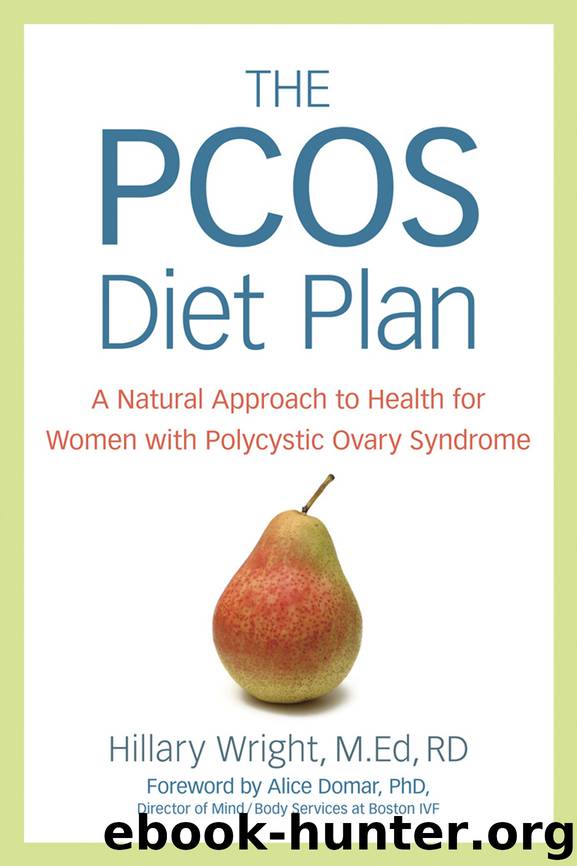The PCOS Diet Plan by Hillary Wright

Author:Hillary Wright [Wright, Hillary]
Language: eng
Format: epub, mobi
ISBN: 978-1-58761-364-7
Publisher: Ten Speed Press
Published: 2010-11-09T05:00:00+00:00
6
Fighting the Weight War
We’ve learned about how to manipulate your diet to manage your insulin response and reduce your risk of heart disease and diabetes—two diseases known to be closely tied to polycystic ovary syndrome. Because many women with PCOS are overweight, the ultimate challenge is weight loss, particularly if they want to get pregnant. Losing weight may be a bit more of an uphill battle for women with the condition, but the positive news is that even modest weight loss—5 to 10 percent of your current weight—may be enough to increase fertility and reduce the risk of developing diabetes and other health problems related to PCOS. For example, if you weigh 180 pounds, a weight loss of 5 to 10 percent is 9 to 18 pounds. If you weigh 230 pounds, a weight loss of 5 to 10 percent is roughly 12 to 23 pounds—that kind of weight loss doesn’t sound too drastic, does it?
I make this point for a few reasons. I want to make it exceedingly clear that you can lose a very reasonable amount of weight and get significant health results, even if your Body Mass Index (BMI) is still quite a bit above the healthy range. Let’s go back to the example of the 230-pound woman, and assume she’s five feet, six inches tall. If she loses twenty-three pounds, she will have lost 10 percent of her weight, now weighing in at 207. According to the BMI charts, she’ll have a BMI of 33, which still puts her in the obese category, but that’s down from a BMI of 37 (when she weighed 230 pounds). Even though you might like to get back into your high school jeans, you can reap significant health benefits from losing modest amounts of weight. Sometimes, at the outset, the journey seems too long. If the very thought of getting your weight into the ideal range—where your BMI is below 25 (which would require our example to get down to 150 pounds)—sounds absolutely overwhelming, that might be enough to discourage you from even trying. An extremely common sentiment is, “If I can’t get my weight into that healthy range, why bother?”
In our society we’re conditioned to feel like we’re supposed to go from overweight to slim and fabulous when we “go on a diet.” We tend to rate our success based on how we look (or what the infomercials say we should look like!) versus how much healthier we are. It’s not that we don’t appreciate the health benefits of weight loss, it’s just that it’s generally not the main attraction. Given the challenges involved in weight loss, we need to expand our definition of success so we can appreciate the benefits of losing an amount of weight that’s reasonable for many people to achieve. This is particularly important if your goal is to become pregnant and reduce your risk of obesity-related pregnancy complications like gestational diabetes. Your likelihood of becoming pregnant and having a healthy pregnancy may improve with a mere 5 to 10 percent weight loss.
Download
This site does not store any files on its server. We only index and link to content provided by other sites. Please contact the content providers to delete copyright contents if any and email us, we'll remove relevant links or contents immediately.
Name Book, The: Over 10,000 Names--Their Meanings, Origins, and Spiritual Significance by Astoria Dorothy(2490)
Tone Your Tummy Type by Denise Austin(2368)
The Women's Health Fitness Fix by Jen Ator(1925)
The Expectant Father by Armin A. Brott & Jennifer Ash(1894)
The Coregasm Workout by Debby Herbenick(1819)
The Ultimate Guide to Anal Sex for Women by Tristan Taormino(1753)
Expecting Better by Emily Oster(1706)
She-ology by Sherry A. Ross MD(1698)
The Hite Report on Shere Hite by Shere Hite(1664)
8 Steps to Reverse Your PCOS by Fiona McCulloch(1596)
Woman: An Intimate Geography by Natalie Angier(1584)
Birth by Tina Cassidy(1572)
Women & the Weight Loss Tamasha by Diwekar Rujuta(1526)
The Female Brain by M.D. Louann Brizendine(1516)
101 Get-Lean Workouts and Strategies by Muscle & Fitness(1506)
50 Ways to Soothe Yourself Without Food by Susan Albers(1399)
The Big Booty Blueprint: Your Guide To A Bigger Butt In Less Than 12 Weeks by Bella Rahbek & Brandon Carter(1367)
Unleash the Power of the Female Brain: Supercharging Yours for Better Health, Energy, Mood, Focus, and Sex by Daniel G. Amen M.D(1286)
The overachievers by Robbins Alexandra(1284)
